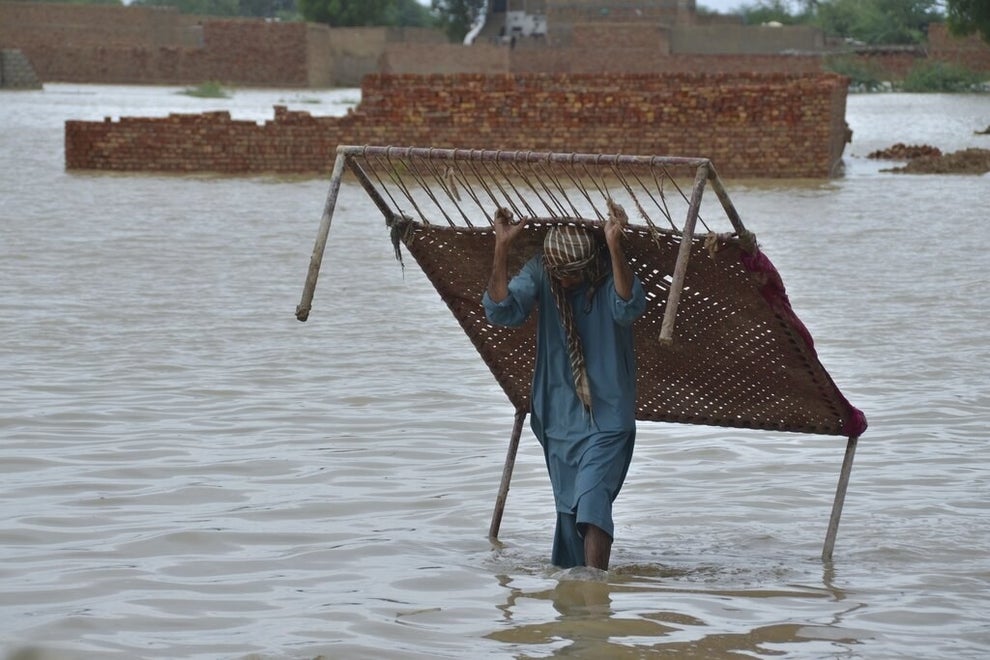While international assistance is slowly trickling in, a lot more needs to be done to protect the country against the ravages of climate change.
Bridges and highways have been swept away, entire villages inundated, standing crops destroyed, homes flattened, hundreds killed and millions of people displaced – Pakistan’s worst flooding in living memory has necessitated the need for immediate international aid.
While Islamabad has declared a national emergency to deal with the deluge triggered by incessant monsoon rains which started in June, the United Nations has also reached out for immediate response.
The crisis has hit the South Asian country at a time when it’s in talks with the IMF for a $1.2 billion bailout loan even as it struggles to shore up its dwindling foreign exchange reserves.
Floods have badly affected the agriculture sector, which employs millions of people and make up more than 20 percent of the economy.
Khuram Husain, a Karachi-based senior business journalist, says 90 percent of the crops in southern Sindh province have been devastated.
“These are staggering numbers. The scale of the flooding is clearly calamitous.”
Sindh and Balochistan, the poorest insurgency-hit provinces, have seen record-breaking rains in the past few weeks, according to the Pakistan Meteorological Department.
In the northern parts on the foot of the Karakoram mountain range, heavy downpour has resulted in deadly deluges.
Videos shared on social media show a picture of desperation as more than 900 people have lost their lives in a matter of weeks.
In Khyber Pakhtunkhwa, villagers watched in horror as flash floods swept away five men stranded on a boulder.
Politicians from across party lines are now calling for international assistance as aid agencies raise concern about the future of millions of homeless people, including children.
Pakistan’s central bank has set up a relief fund to collect donations from locals and expats.
Prime Minister Shehbaz Sharif has formally requested the international community to pitch in for relief efforts and met foreign diplomats on Friday in Islamabad.
“We have reached out to donors, friendly countries & international financial institutions for assistance to respond to the scale of flood calamity. I will be meeting Islamabad-based ambassadors & high commissioners tomorrow to apprise them of nature of challenge & need for help (sic),” he tweeted.
Multilateral agencies, including the World Bank, have pledged $500 million to cope with the emergency on an immediate basis, officials say.
A climatic disaster
Before the monsoon rains, parts of Pakistan and India sizzled under scorching temperatures, which broke all records for March and April.
Rising temperature attributed to climate change has led to melting of glaciers in Pakistan and raised the risk of flooding in low-lying areas.
In late May and early June, temperature in Jacobabad, Dadu, Larkana, Sukkur and other districts of Sindh touched more than 45 degree celsius.
“It was exam time and it was so hot that school children were fainting,” Nasir Ali Panhwar, an environmentalist, tells TRT World.
“For the past 4-5 years, the seasonal pattern has really changed. This year there was no spring in Sindh, we just skipped spring and directly ended up in summer.”
Historically, only Jacobabad experienced temperatures in the highs of 45-50 degree Celsius but now the heatwave has spread across Sindh with increasing frequency.
“A few reasons for the recurring heat wave include lack of forested area. In other countries, the forest area should be around 25 percent. In Pakistan it is 3-4 percent,” says Panhwar.
While dams and water reservoirs are filled to their capacity now, just a few months back experts were concerned about the lack of water flow in the Indus River, a lifeline for farmers.
“We have forest land but no forests. This is one of the natural factors that we don’t get annual inundation of the Indus River anymore,” says Panhwar.
“It’s particularly distressing for the farm output as the weather pattern changes.”
By SAAD HASAN














